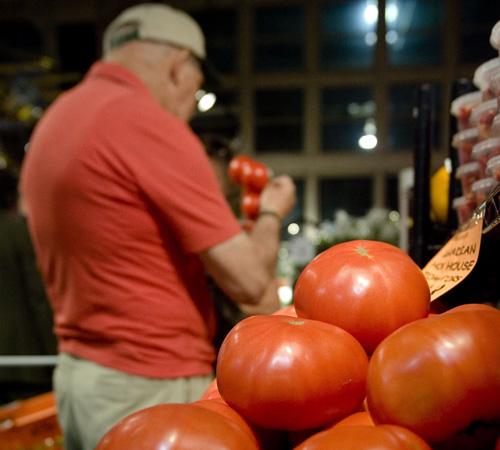Champaign restaurants, grocery stores trash tomatoes after recall

Shown are Canadian Hot House Tomatoes at a produce seller at the Reading Terminal Market in Philadelphia on Tuesday. The Food and Drug Administration has released a list of farming locations, including Canada, California, and Hawaii, that it believes are Matt Rourke, The Associated Press
Jun 11, 2008
Last updated on May 13, 2016 at 11:34 a.m.
With nearly 200 people from 17 different states sickened by an outbreak of Salmonella early this week, local Champaign restaurants and grocery stores are continuing to follow FDA nation-wide recommendations to pull many red plum, red Roma or round red tomatoes from their shelves or menus. Texas and Nevada has linked illnesses to the consumption of raw tomatoes, however, the Illinois Department of Public Health will await more tests before confirmed that the salmonella outbreaks in the state are connected to the tomato crop and products.
“The Illinois Department of Public Health is still investigating the link between the outbreaks to tomatoes, but we are encouraging people to follow FDA warnings,” said Melaney Arnold, spokesperson for the Illinois Department of Public Health.
According to Arnold, outbreaks in Illinois, most of which have been found in the northeastern part of the state, have turned up strains of salmonella saintpaul which match the national strains currently under scrutiny.
The Department of Public Health is working to inform the public and retailers about FDA warnings. Most local restaurants in Champaign-Urbana have temporarily discontinued the sale of tomato products.
Get The Daily Illini in your inbox!
“After we received the FDA warnings, all our restaurants pulled all our tomato products off the shelf,” Potbelly Sandwich Works manager Brian Noparstak said. “Most of the students didn’t initially know about the outbreaks, but they have been laid back and understanding about the change.”
Chipotle, McDonald’s and Burger King have pulled tomatoes from their menus nationally.
Local grocery stores have also pulled roma and plum tomatoes and were updated by the FDA that cherry, grape and other vine tomatoes are acceptable for retail. Customers at Meijer can come into the store and get a refund for their tomato products or exchange them for different produce items.
“We have many customers calling and asking if their tomatoes might be infected,” Dawn Carley, Meijer produce manager said. “I think it’s better to be safe than sorry. We’re offering refunds because we just want our customers to be happy and safe.”
Because of factors such as large factory farming conditions and long distance shipping that may be a heating vector for pathogens, the exact source of the salmonella saintpaul strains have not been identified. Although it is not tomato season in Illinois, consumers who buy their produce from local growers will not need to worry about salmonella outbreaks. Director of Urbana’s Market at the Square Lisa Bralts said market customers are able to purchase vegetables that are hydroponically farmed, or grown in water without the use of soil. During times where national produce area being pulled off the shelf, the farmer’s market usually sees large increases in its sales.
“Customers can meet face to face with the grower and know for sure that their produce has been looked after properly,” Bralts said. “The advantage of locally grown produce is that you know that it has only been picked a few days before retail and you know that the farmers use their own trucks. The produce is always fresher that way.”
No outbreaks have been found in Champaign-Urbana. Most persons infected with salmonella develop diarrhea, fever and abdominal cramps 12-72 hours after infection. Infection is usually diagnosed by culture of a stool sample. The illness usually lasts 4 – 7 days and most people can recover without treatment.
The Associated Press contributed to this report





